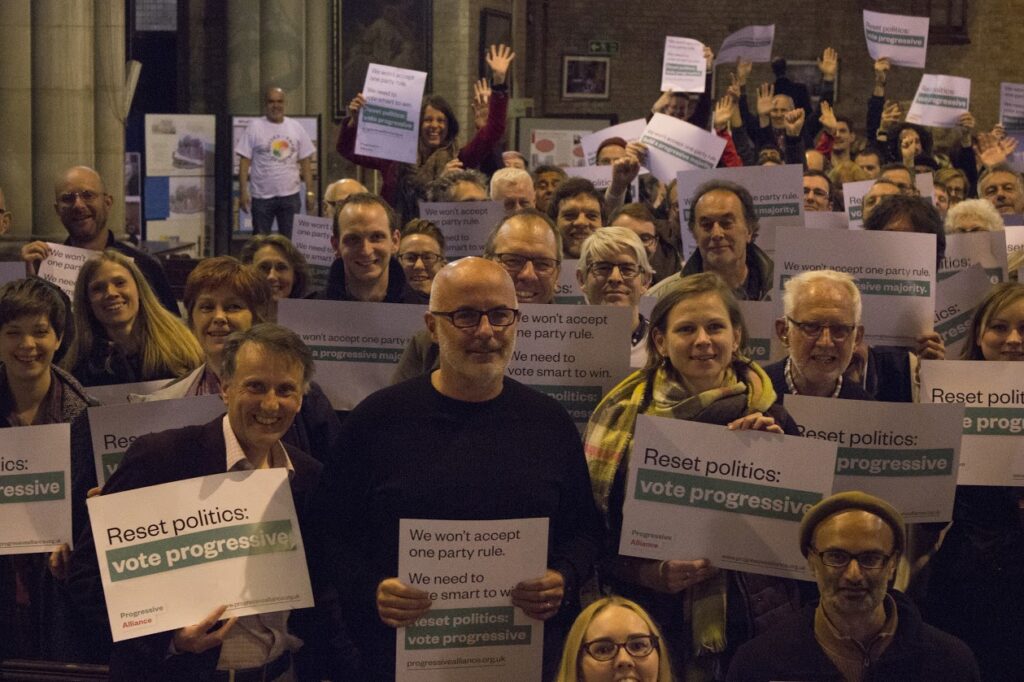
In recent days we have seen a bold, innovative argument for a progressive alliance from Caroline Lucas, Layla Moran and Clive Lewis, as well as considered criticism calling for Labour to forgo such an alliance.
It is hugely encouraging that this time the debate over a progressive alliance is happening now and not a few months before the general election.
But this is not just debate – out there in the real world parties and voters are doing progressive-alliance-style politics, doing deals about where to campaign and whether to stand. And councils are doing progressive-alliance-style deals in Cambridgeshire, Oxfordshire, Sheffield, Burnley and Milton Keynes, to name a few. In Bristol, the Greens won half the council seats – this collaborative politics is here to stay.
Compass is working with progressive MPs like Clive, Layla and Caroline, and our members across the UK, to build this new kind of politics.
It can be messy and tricky, but the idea of one big tent is over – the future is a progressive campsite, and we have to deal with it.
Critics of the progressive alliance assume it would be all about standing aside and doing a policy deal – there could be elements of both, but it is likely to be more nuanced. Compass believes that what is needed is less a Death Star and more a Rebel Alliance.
A detailed policy agreement is unlikely and probably unnecessary – though all progressive parties backing proportional representation would help a lot. Labour is on its way, with over 200 constituency Labour Parties (CLPs) throwing their weight behind PR. Compass is proud to support this work as a founding member of Labour for a New Democracy.
Every Labour member supporting PR knows it leads to cross-party collaboration. We need a broad agreement on the kind of future we want: on democracy, the environment, inequality and care.
Like 1997, we need to create an anti-Tory, time-for-change mood. That requires trust and relationships. It is a slow build, not a fix.
How this manifests itself is to be worked through. Stand-asides can work in some places, but not all – Labour won Canterbury in 2019 because of a Lib Dem candidate soaking up soft-Tory votes. The biggest thing won’t be stand-asides but tactical campaigning and voting, because those are easiest to do.
I agree with critics of the progressive alliance that we don’t own the voters – but it is a political job to build an anti-Tory majority. And every poll shows it is at least possible.
A progressive alliance happens if Labour is in the sweet spot where it can’t win on its own but looks like it can lead a new government. It is pretty near that spot now. Of course it has to get its house in order – a progressive alliance isn’t a shortcut past that hard work. But the system and the voters are now too fragmented to reenact 1997.
Winning 125 seats for a majority of one is beyond Labour’s reach. A progressive alliance of the looser type I outline will be tricky to pull off but I am not sure what the other option is, other than to keep losing.
We will see what happens in the two upcoming by-elections where no cooperation is in place.
Neal Lawson is Director of Compass.
Find out more about Compass’ work to unlock the Progressive Majority.

Our disfunctional electoral electoral system does not allow us to choose between a range of candidates or parties. Most voters have no influence over which party forms a government because their member of Parliament is pre-chosen for them by whichever local party is dominant in their constituency. “Safe seats” are dangerous to democracy. To get good government we must change this. The only way to do this is to support as fully as possible whichever party in your locality will support electoral reform and defeat the Conservative exponents of an undemocratic voting system. Progressive parties must commit to electoral reform and work together intelligently to defeat Conservatives. This should not be difficult to understand.
As a new joiner and a political activist in West Cornwall with a public profile, I would like to be part of (or kickstart) a Cornwall Compass group. I work in a Constituency with a high chance of electoral success against the Conservatives. A succession of General Elections have been lost with small margins, but there is a growing readiness of voters to swap or vote tactically, and in 2019 there was cross-party support in terms of volunteer campaigning. I hope and believe that the presence of a Compass group would help in a process of creating a more formal “rebel alliance” and in reaching out to the local Labour Parties particularly. If possible, I would like to connect with other Compass members in Cornwall.
An important component in building the Progressive Alliance we need could be promoting support for the CEE Bill. I think Compass should prioritise this. It might even lead a call for Keir Starmer to support the bill, as other ‘ progressive’ party leaders have already done
It worries me that the Labour voice on this is always Clive Lewis. Is this actually getting any traction among anyone else of influence in the party, or is Labour still clinging to the delusion that it can overturn the Tory majority and govern on on its own? Or worse, knows it can ‘t do that, but refuses to co-operate with anyone else except on its own terms?
The only person who gains from another round of the “Greens must join Labour and nobody’s allowed to trust the Lib Dems” nonsense that we had before the 2019 election is Boris Johnson. I think the Labour Party collectively knows that, but how confident are any of us that it’s emotionally capable of acknowledging as much?
Time for a progressive alliance that is patriotic and of reformist and revisionist social democracy broadly speaking